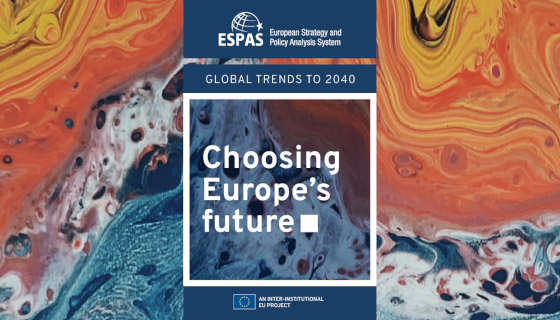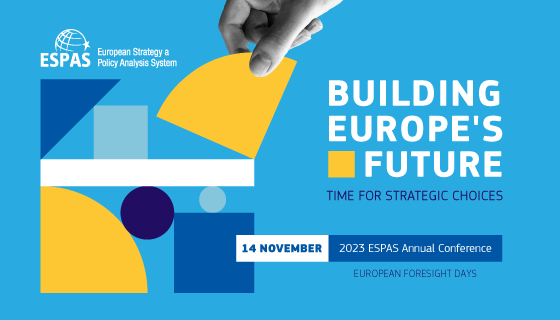15 APRIL 2024
Global Trends to 2040:
Choosing Europe’s future
The 2024 ESPAS Global Trends Report, ‘Global Trends to 2040: Choosing Europe’s Future’ was launched at an event in the European Parliament on Monday 15 April.
You can watch the recording of the launch here.
This is the fourth ESPAS global trends report since the establishment of this inter-institutional EU foresight process in the early 2010s. As on previous occasions, it is being published in a year when the European Union embarks on a new five-year institutional cycle. The report analyses the key global trends and their possible impact on the Union, and sets out some strategic choices and questions that Europe's leaders may need to address in the coming five years and beyond. The report is the product of a unique collaborative process over the past year involving officials from across the nine ESPAS institutions and bodies.
14 NOVEMBER 2023
2023 ESPAS Annual Conference
Building Europe's Future: Time for Strategic Choices

The annual conference of the European Strategy and Policy Analysis System (ESPAS) was held on Tuesday 14 November. As in previous years, it was co-hosted by the European Commission and the European Parliament.
At a time when an illegal and unprovoked war continues to rage on European soil and ahead of the next EU institutional cycle, this year's 11th ESPAS annual conference focused on the key global trends at the crossroads of geopolitics, the environment, technology, the economy, and democracy. We debated, inter alia, the growing linkages between stability, security and the economy, the global tech race and future social, economic and environmental fairness, and digital technologies and their impact on democracy. We also mapped the related strategic choices for Europe in the period to 2040.
"Building Europe's future: time for strategic choices" conference was a stepping stone in the journey towards the fourth ESPAS Global Trends Report, published in February 2024. We hope this conference will help to shape the public debate in the lead-up to the European Parliament elections in 2024, and offer citizens a forward-looking perspective for Europe.
Conference 2023Programme 2023Speakers 2023
17 - 18 NOVEMBER 2022
Geopolitics is back:
Charting a course for the EU in a world of shifts and shocks

The global financial crisis of 2008, the migration crisis in the early 2010s, the coronavirus pandemic of 2020, and Russia’s war on Ukraine, have all demonstrated very clearly how the world is increasingly being hit by multiple, overlapping crises with significant impacts both on Europe and the rest of the world. This has piled great pressure on policy makers in the European Union and globally, to react quickly to unprecedented and highly complex situations against a backdrop of great uncertainty.
How can policy makers make the best decisions in such a complex and uncertain environment?
Building resilience in the face of crises, while maintaining the capacity for being strategic, requires policy makers to have at their disposal, the capacity for holistic thinking, and for looking beyond the usual horizons.
Systemic thinking and foresight, with its capacity to foster collective intelligence, strategic understanding and long-term thinking, can also be instrumental in helping policy makers to reinforce their ability to “stay the course” for the long-term.
This tenth anniversary ESPAS Annual Conference sought to provide a strong, forward-looking perspective on key global challenges and how we can build a robust, sustainable future for the European Union. The Conference took place at a time when the phrase 'new era' seemed to be on everyone’s lips. But what does this mean? Does everybody have the same understanding of this 'new era'? The shifting tectonic plates of geopolitics demand from us a greater understanding of different global perspectives which, in turn, may enable the European Union to position itself at the heart of whatever global order emerges from today’s uncertainties.
Together with experts and policy makers from around the world, we explored the key challenges and opportunities which confront all of us. How are they changing the emerging international security architecture? Are we at the core of a new “battle of ideas”? What do they mean for strengthening a resilient democracy at home and around the world? What will the twin green and digital transitions look like? What will Russia’s war on Ukraine, climate change, and environmental degradation mean for food and energy supplies? How can we build a more sustainable and fairer global economy?
This Conference provided a platform for fostering the emergence of new ideas to feed a long-term vision for a strong and sustainable EU in a complex and uncertain world. Importantly, it supported the development of an international dimension for ESPAS (the 'ISPAS dialogue')* and helped to nurture new thinking and ideas for the 2024 ESPAS Global Trends Report.
*International Strategy and Policy Analysis System.
Conference 2022Programme 2022Speakers 2022
18 - 19 NOVEMBER 2021
Shaping Europe's future:
Global trends and strategic choices

The 2021 ESPAS Annual Conference took place on Thursday, 18 and Friday, 19 November, with successive days hosted by the European Commission and the European Parliament.
Leading public figures and experts from around the world came together, largely virtually, to identify and analyse long-term global trends. Speakers addressed the implications of these trends for the European Union, and highlighted some of the choices Europe needs to make in a rapidly changing world. The role of foresight in this endeavour was at the heart of the discussions over the two days.
Conference 2021Programme 2021Speakers 2021
18 - 19 NOVEMBER 2020

Thinking about the Future
Europe's Road to 2030
The 2020 ESPAS annual conference - Thinking about the Future: Europe’s Road to 2030 - took place at the end of a momentous year in human history. The coronavirus pandemic is having a profound impact on societies and economies, and it is clear that many long-held assumptions about how we live, work and relate to each other are being challenged as never before.
In the course of this two-day conference, we considered how to build a more resilient Europe in an uncertain world, and explored how Europe can navigate existing and emerging global trends in order to chart a course for 2030.
Programme 2020